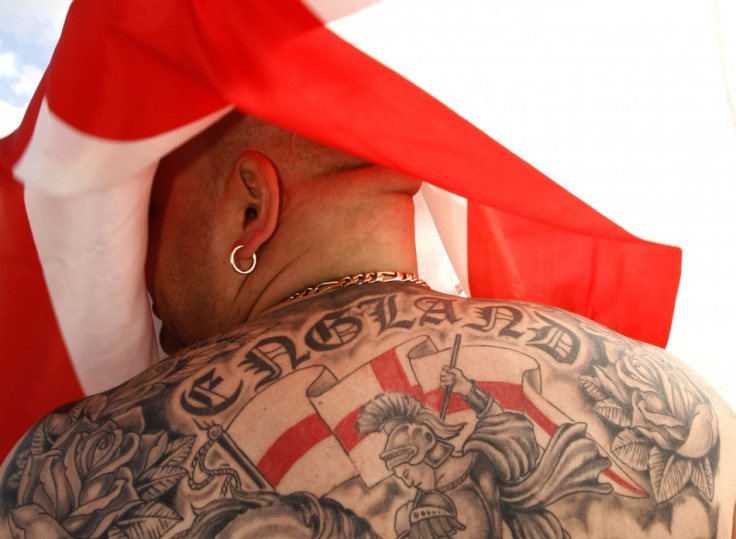St George's Day: Why We Don't Celebrate the Patron Saint of England

Despite the efforts of some to whip England into a frenzy of national pride, the majority of us still choose to turn a blind eye to St George's Day. The association with extreme right-wing groups - and thus, connotations of racism - have rendered the majority of the population to regard national pride with embarrassment. Although this is, arguably, fairly English of us.
St George's Day and the sight of the English flag brings up a mental (and unfortunately irreversible) image of topless members of the British National Party. Along with the Union Jack, the English flag is now associated with the likes of pro-separatist, anti-immigration groups (please read anti-immigration as "blatantly racist"). It smacks of football hooligans, thuggery and racial intimidation - not patriotism.
Earlier this week, UK Independence Party leader Nigel Farage defended his party's "racist" election poster campaign ahead of the May European elections. The campaign - which epitomises the knee-jerk reactionary crusades Ukip take pride in - is a prime example of why we choose to ignore St George's Day.
One of the billboards shows a man dressed as a builder begging for spare change, next to the words: "EU policy at work. British workers are hit hard by unlimited cheap labour." Another poster depicts a giant finger pointing at the viewer, and reads: "26 million people in Europe are looking for work. And whose jobs are they after?" Perhaps yours, Farage, and the UK would be better off for it.
It is because of these campaigns, that unlike St Patrick's Day, which sees hoards of revellers take to the streets clutching pints of Guiness to celebrate the patron saint of Ireland, England's equivalent is largely ignored. With the exception of the BNP, of course, who are selling St George's Day cards.
It is a proven fact that we simply don't do St George's Day. Research carried out in 2013 by the think tank British Future revealed that most English people are "nervous" about celebrating St George's Day. The poll, which was published by the Daily Telegraph, found that concerned that promoting the St George's Cross may be interpreted as racist. One quarter of children, meanwhile, thought that St George was someone who "had gone to the moon" - in a survey for Fun Kids Radio.
Some historians have attributed our discomfort with celebrating St George's Day to our Protestant history. Diarmaid Macculloch, a professor at the University of Oxford, believes the English apathy towards the day may be a consequence of the reformation. He explained to the Huffington Post: "The English, being Protestants for nearly five centuries, have never had much time for saints' days - same with the Scots."
A valid argument - but for me, at least, the association of St George's Day with extremist organisations is the most off-putting factor. St George's Day - and the St George's Cross flag - has been used to promote racial violence and segregation, rather than national identity and patrotism. And as a result, all four concepts are now intertwined. Sandwell council, in the West Midlands, even withdrew funding to St George's Day celebrations in 2009 after it attracted "racist elements".
The day also advocates the exclusion of the majority those living in England. Aside from the NHS - which, despite its problems, provides care when we fall off ladders or succumb to illness without having to shell out thousands of pounds on our deathbeds - one of the positives of England (and the rest of Britain) is its status as a multi-cultural, multi-religious society. Considering Great Britain is such a melting pot of different races, St George's Day and the claim of "being English" is largely obsolete.
Seemingly having forgotten about the separation of church and state, David Cameron made headlines over the Easter weekend by declaring the UK "Christian". Yet the majority of us are uncomfortable with making such divisions - probably due to the large number of Athiest, Muslim, Hindu, Sikh, Jewish and Buddhist populations (among others). We should be celebrating our mix of ethnicities and religions, rather than departmentalising the country into those who are "English" and those who are not.
© Copyright IBTimes 2024. All rights reserved.





